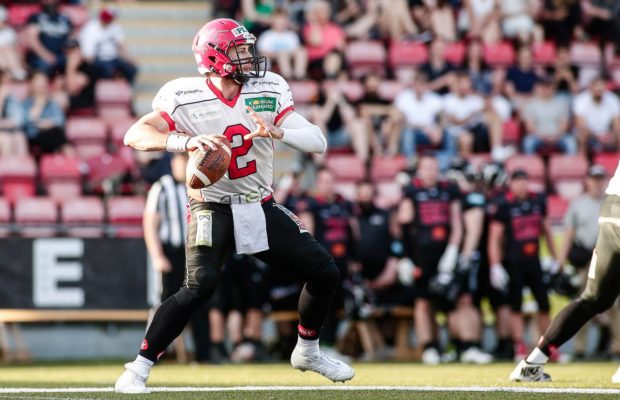5 Leadership Lessons from an American pro quarterback in Europe

The position of quarterback in American football is one of the purest leadership roles in any sport. Virtually every play starts with a quarterback. The top few dozen professional quarterbacks like Tom Brady get fame and fortune for doing the job. Beyond those players in the NFL, there are dozens of other men who get paid to do the job of quarterback for professional or semi-professional teams in the US or other countries. Phil Juhlin of the Carlstad Crusaders in Sweden is a professional American quarterback playing overseas. Juhlin was a high school star in Tennessee before coming to Sweden, where he has also been a star. During a trip to Sweden, I recently interviewed Juhlin about the lessons in leadership he has learned by playing American football in Europe:
Look for Player-Coaches When Hiring – European teams are typically allowed to import one or two players from outside their home country. This usually means they get a recent college football player from the USA. The good teams learn to look for more than just football-playing talent from these “imports.” They expect these players to serve as additional coaches as well because they have more advanced football experience than their teammates. Juhlin, for example, had to give his teammates a pep talk recently to help put a tough loss in a championship game into the right context.
Tailor Motivation to Each Individual’s Needs – European teams are often a mix of paid players and volunteers. The needs vary a lot among players. The volunteers are motivated mainly by the love of playing the game. The professionals also love the game, but may have other needs. Some are looking to get plays on tape that can go on a highlight reel they can use to market their talents to NFL scouts. Some want a job that allows them to see a new part of the world. Some just want to continue their football career as long as they can before they start a new career. A key to leading each individual most effectively is to understand what their motivations are that you can appeal to.
Use Flexibility as a Force Multiplier – While NFL teams have players on their roster who specialize in kicking the ball, European teams often can’t afford that luxury. Juhlin is one of the players who punts the ball for his team when needed. While Juhlin is not a natural punter, he makes up for it by using his flexibility. When the situation calls for a punt, he often lines up where he could either pass or punt the ball. By keeping the other team unsure, he prevents them from setting up to field a punt. That means even a short punt can roll for a long time into a long punt.
Find Creative Ways to Communicate – Surprisingly, there isn’t much of a language barrier between imported players on Carlstad and their Swedish teammates. Most Swedes learn English at a young age. Swedish football players learn football-specific jargon by playing and watching football, whether it be on the field or on a TV or video game screen. Because they run a no-huddle offense, Juhlin still has had to get creative in communicating plays to teammates, particularly when they are asked to fill in at a new role. In one game, for example, he had a receiver start every play in the backfield with him so he could tell him where to go on the play. After getting the instructions, the receiver went in motion out to his position before the ball was snapped.
Understand Who Your Competition Is – As an American football player in Sweden, Juhlin and his coaches realize their competition isn’t just across the field – they also have to compete for attention from fans. The most popular sports in Sweden are hockey and soccer, two sports that have continuous action until they reach a scheduled break. Swedish fans aren’t used to all the breaks between plays that occur in American football. Juhlin operates his offense using a no-huddle approach. The main reason may be to keep defenses off balance, but it also helps to move the game along faster for fans.
Juhlin and his teammates must be doing something right. If they win their Swedish league championship this year, that will mark 8 years in a row, a feat perhaps unprecedented in any Swedish national sport. When I asked Juhlin about his career plans, he said he was exactly where he wants to be despite the fact that he gets calls from other teams looking for a new quarterback. He did add with a smile that after his professional days are over, he might just continue to suit up as an amateur in Sweden so he could live out his dream of playing Safety on defense. I wonder how many other pro quarterbacks secretly harbor that same dream.
Read the original article in LinkedIn. Reprinted by permission.
© Copyright Victor Prince, All Rights Reserved.